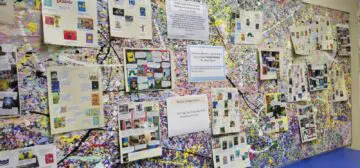Program Updates: Language Arts – October 2024
Language Arts
6th Grade


6th graders put the finishing touches on their Textual Lineage Posters last week. Back in September they listed books they remembered fondly, then narrowed that list down to the ten texts
that were especially significant, memorable or important to them. Their reflections about the books they loved are so fun to read! This month we kicked off a personal narrative writing unit and began reading Sandra Cisneros’s lyrical novel, The House on Mango Street. Discussing how these vignettes capture Esperanza’s emotional experiences of a time and place is a perfect complement to the narratives 6th graders are writing this month. They will have the chance to revise and polish one of their many free writes into a longer narrative later this fall.
7th Grade
Students in 7th grade have been building both academic and social-emotional skills as we undertake our language arts studies this fall. After reading non-fiction texts on identity and the idea of “normal,” students were tasked with creating an artifact that highlighted the “main character energy” they bring to EW. Check out the bulletin board next to the Language Arts classroom to see their work. It is a delightful representation of who they are both as individuals and as a class.
Next up was our provocative challenged and banned books unit. Students dove deep into the state of book challenges in the U.S. by reading essays and articles on the topic and reviewed data collected by the American Library Association. Your young people learned the difference between a book challenge and a ban, which communities are most targeted by book challenges, and the importance of being able to find one’s stories reflected in a book. The unit culminated in a choice assignment: students created either a poster, a piece of creative writing, or a persuasive paragraph or essay about book challenges and the need for diverse texts. Your students produced some amazing posters and thoughtfully written pieces. Ask your student what they feel are the most important takeaways from this unit, and look for some of their outstanding work displayed in the LA classroom.
Presently, we are in a mini-unit featuring two graphic novels by Jerry Craft: New Kid and Class Act. These engaging texts are excellent practice for paying close attention to characterization, particularly methods an author uses to reveal information about their characters. Students are tracking themes throughout a text and practicing how to respectfully engage in potentially challenging discussions about race, class, and identity. Non-fiction readings are helping us learn the nuances between practicing perspective-taking and perspective-receiving. These academic and discussion skills will be very useful as we soon head into our all-class novel, The Last Cuentista.
8th Grade
Eighth grade is wrapping up the “Authoring Identity” short story unit that kicked off their year. Students were introduced to the concept of “narrative identity”–the psychological theory that we are both the main characters and the narrators of our life story–through non-fiction readings including articles and transcripts. We then closely read, annotated, and discussed several short stories, noticing how the amount of agency the narrators felt in their lives influenced their self-perception and sense of well-being. Class discussions included the role of risk-taking in learning and growing and how the same life events can be interpreted differently depending on the beliefs and sense of agency of the person experiencing them. We practiced looking for text evidence to support our ideas and experimented with various organizers and tools to discover which works best for individual students when preparing and planning for drafting literary analysis pieces.
Next up for eighth-graders will be our Suspense and Horror unit. Students will continue their close reading and annotation practice with non-fiction articles centered around why so many people love to be scared and the history of ghost and scary stories in the U.S. We will use several short stories as mentor texts to analyze how writers carefully craft settings to cultivate mood, learn tips and tricks for building suspense, and become more intentional about vocabulary/word choice to help our readers experience the emotions we want them to feel. We will end this unit by writing our own suspense or horror stories. Do not fear–if your student is not a horror fan, they absolutely will NOT be required to read a horror text! They are welcome to stick to suspense.
Is your student a reluctant reader? Check out this article about how to encourage more reading in your household. There are SO MANY great books out there. If you are concerned about your child’s lack of interest in reading, let’s talk.
